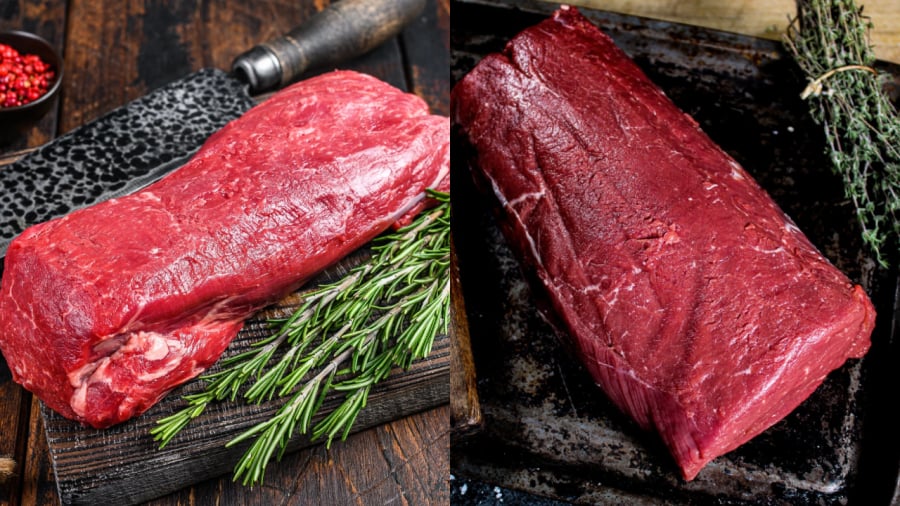Beef is a red meat that boasts a high nutritional value, especially in protein and iron content, making it a healthy option. You can cook beef in numerous delicious and nutritious ways.
Nutritional Value of Beef
According to VietNamNet, Doctor and Bachelor Nguyễn Trọng Hưng from the Examination and Nutrition Consulting Department of the National Institute of Nutrition, and Doctor Lê Ngô Minh Như from Ho Chi Minh City University of Medicine and Pharmacy, Campus 3, beef is rich in protein, vitamin B6, vitamin B12, iron, and other minerals. Notably, the amount of protein and vitamin B6 in beef is considerable. Approximately 100 grams of beef provides 22 grams of protein.
Beef is an excellent energy source and helps with muscle growth and blood production in the body.
Those who want to lose weight and those who want to gain weight can both benefit from eating beef. Especially for individuals engaging in high-intensity workouts aiming to build muscle mass, beef is an ideal food choice. The linoleic acids in beef help maintain muscle mass, while vitamin B12 supports red blood cells in carrying oxygen to the body’s tissues.
In Traditional Chinese Medicine, beef is considered a medicinal food, particularly effective for treating gallstones. It has a bitter and slightly sweet taste, a neutral nature, and is slightly toxic. It enters the heart, spleen, and liver meridians and helps resolve phlegm and treat stroke…
Cattle’s liver, spleen, and hoof are all edible and provide various health benefits.

Individuals with the Following 6 Conditions Should Refrain from Eating Beef
While beef offers a plethora of nutritional benefits, it may not be suitable for everyone. Individuals with the following health conditions should limit their beef consumption:
- High Blood Pressure
Beef contains high levels of saturated fat. Consuming excessive amounts of saturated fat can lead to cardiovascular and blood pressure-related issues. Individuals with a history of high blood pressure should limit their intake of foods high in saturated fat, including beef.
- Uterine Fibroids
Beef has the potential to increase hormone levels in the body, including estrogen. For individuals with uterine fibroids, consuming large amounts of beef may negatively impact the condition and worsen the situation.
- Chickenpox
Individuals suffering from chickenpox are advised to refrain from consuming beef and other strong-flavored foods such as chicken, duck, and seafood.
- Arthritis
Beef is high in protein, and its consumption leads to the production of acids in the body. These acids require minerals like calcium to be neutralized. If calcium intake is insufficient, the body will draw calcium from the bones, leading to bone and joint problems over time. This can exacerbate arthritis and contribute to osteoporosis.
- Kidney Stones
Individuals with kidney stones should limit their intake of high-protein foods like beef, fish, and poultry. These foods increase oxalate levels in urine, elevating the risk of kidney stone formation.
Additional Considerations When Consuming Beef
While beef is highly nutritious, even healthy individuals should not consume more than 500 grams of cooked beef per week.

It is important to avoid consuming raw beef due to the potential risk of parasitic infections. Beef should always be cooked thoroughly before consumption.
The information provided here clarifies which individuals with specific health conditions should refrain from eating beef. Those with health concerns should consult with their doctors regarding dietary recommendations and medication to ensure effective treatment.
3 Ways Tofu May Not Be As Healthy As You Think
Tofu is not just a delicious food, but also a “superfood” for heart health, bones, and the endocrine system. This soy-based food is a powerhouse of nutrition and offers numerous health benefits. However, despite its impressive nutritional profile, there are a few things to keep in mind when incorporating tofu into your diet.
The Best Time to Drink Milk: Morning or Night? Uncover the Surprising Truth and Maximize Nutrition.
Introducing our resident health and wellness guru – your trusted guide to all things nutrition and wellbeing. Delve into the fascinating world of dairy as we explore the myriad benefits of milk and its positive impact on your health. Learn from the experts as they reveal their top tips for incorporating milk into your daily routine in the most beneficial ways. It’s time to unlock the secrets to a healthier, happier you!








































